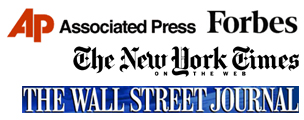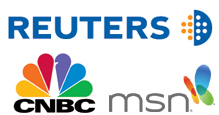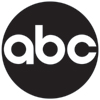NewsBites
Several influential media featured the accomplishments of the School of Management and the expertise of its faculty over the past year. Below is a summary of some of the school’s citations in prominent national and regional media. These media “hits” enhance the school’s national reputation and help to brand it as one of the nation’s top business schools.

AP, New York Times, Wall Street Journal, Forbes
Arun Jain, Samuel P. Capen Professor of Marketing Research, was quoted in an Associated Press story that ran in hundreds of national outlets, including the websites of The New York Times, Wall Street Journal, Forbes and Huffington Post. Commenting on how the Social Security tax cut seemed to have little effect on consumer spending early in the year, Jain said, "When people get these types of paycheck boosts from the government, typically the first area people will spend on is essentials for the family." However, he noted, "I think the next big event we need to watch is for Easter sales. That will reflect what they want to buy for spring. That to me will tell us how confident they are."

UPI, Businessweek
Phishing research by H. Raghav Rao, SUNY Distinguished Service Professor in the Department of Management Science and Systems (MSS), Arun Vishwanath, associate professor in the UB Department of Communication, and three MSS doctoral alumni received significant coverage in April. The study showed that people who send and receive numerous emails, have many online relationships and shop online are more likely to be targeted for phishing, a tactic where scammers use the names of credible businesses, government agencies or current events, in conjunction with urgent-sounding messages, to get people to divulge their passwords, usernames or credit card details. "Individuals need to be extra careful when utilizing a single email account to respond to all their emails," the researchers said in a statement following the Epsilon email breach. "An effective strategy is to use different email accounts for different purposes. If one email address is used solely for banking and another is used solely for personal communication with family and friends, it will increase your attention to the details of the email and reduce the likelihood of chance deception because of clutter."

Reuters, CNBC.com, MSN.com
Ronald J. Huefner, SUNY Distinguished Teaching Professor Emeritus, was quoted in a Reuters article that was featured on the CNBC and MSN websites. The article stated that AT&T would begin reporting gains or losses from its pension funds in the year in which they occurred, instead of amortizing them over several years, a process Huefner called "smoothing." He said, "Earnings will probably be more volatile. One of the reasons for the rules that we had is that they tried to take the volatility out, recognizing that there would be good years and bad years."

CNBC
Kenneth Kim, associate professor of finance and managerial economics, was quoted in an article on the CNBC website about Super Bowl ads and stock prices. Kim questioned whether a post-game bump in share prices for popular commercials actually leads to increases in sales later in the year. "The immediate reaction is most accurate," Kim said. "On that Monday, commercial likability is probably the most salient information investors will use. A month out, too much other information has been impounded on the stock price. While the Super Bowl effect has not disappeared, something else has happened." Nevertheless, Kim said, "We will be bullish on [Super Bowl] Monday."

Financial Times
Jerry Newman, SUNY Distinguished Teaching Professor in the Department of Organization and Human Resources, was quoted by the Financial Times in April in an article on people who write books after going "undercover" at low-paying jobs. Newman worked at McDonald's and other fast-food restaurants to write My Secret Life on the McJob: Lessons from Behind the Counter Guaranteed to Supersize any Management Style. "People told me things they would have never told me as a university professor," he said. For example, one manager told Newman she was trying to force an elderly employee to quit so she wouldn't have to deal with the cost of firing her.

ABC News
Newman also was interviewed for an ABC News story on McDonald's, which was recruiting 50,000 new workers in April. Newman said that working at McDonald's can teach important skills such as teamwork, reliability and handling pressure. "I've spoken to a crowd of 5,000 before, and I'll take speaking to 5,000 people over a lunch rush any day," he said.

Bloomberg Businessweek
Bloomberg Businessweek ranked the School of Management as one of the nation's "Best Undergraduate Business Programs of 2011." The school was ranked No. 82, up 15 places from last year (see Start-Ups).

U.S. News & World Report
The School of Management was again ranked a "Best Business School" by U.S. News and World Report in its annual ranking of MBA programs in its issue featuring "America's Best Graduate Schools." The school was ranked No. 75 out of 437 MBA programs surveyed (see Start-Ups).

Buffalo News
Charles Lindsey, assistant professor of marketing, was quoted in The Buffalo News on the modest initial sales for the Verizon iPhone in Western New York. Lindsey said the lower-than-anticipated turnout could be attributed to consumers taking a wait-and-see approach to possible bugs, negative weather conditions or record-setting presales for the item. However, "What I've heard so far is sales are steady," Lindsey said. "The sales are really robust (overall)."
David Murray, associate professor of management science and systems, was quoted in a story about people hijacking their neighbors' Wi-Fi to conduct illegal activities. "Most people don't realize the dangers they could face if they don't take the right security steps when they install Wi-Fi on their computers," he said.
Hodan Isse, assistant professor of finance and managerial economics, was quoted in a Buffalo News story on the effects of the Japan earthquake and tsunami on the U.S. economy. Isse said that only a few weeks after the events, shortages of auto parts were already occurring. "If this disruption in the supply chain continues for a long time, it might have a dramatic effect, especially for those who use those products." On the other hand, due to a tainted food supply, Japan may need to rely on imported foods and services from the U.S., which could create U.S. jobs, Isse said.
